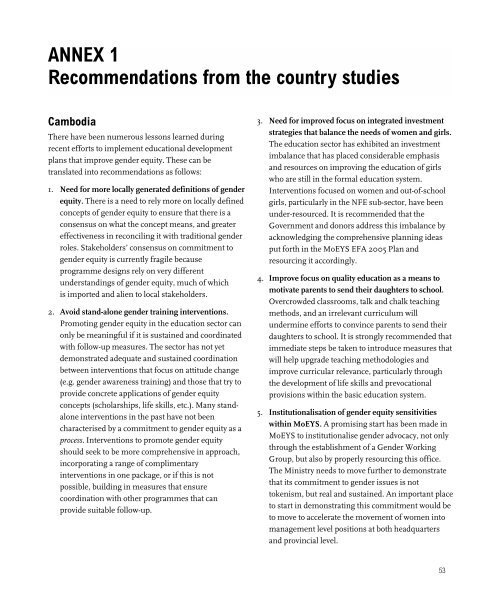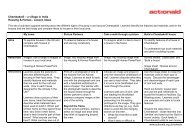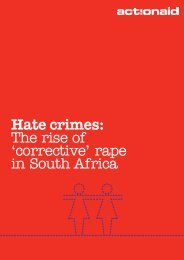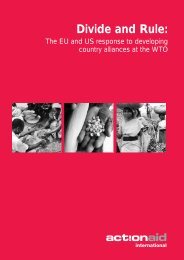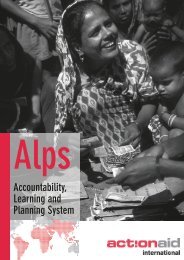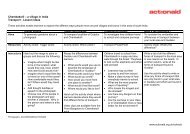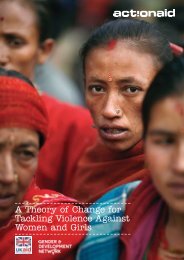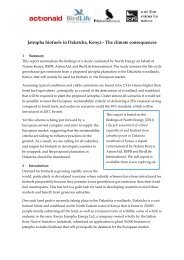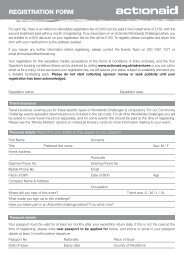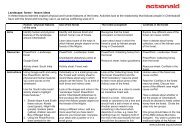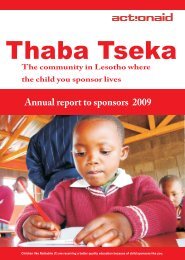A fair chance - United Nations Girls' Education Initiative
A fair chance - United Nations Girls' Education Initiative
A fair chance - United Nations Girls' Education Initiative
You also want an ePaper? Increase the reach of your titles
YUMPU automatically turns print PDFs into web optimized ePapers that Google loves.
ANNEX 1Recommendations from the country studiesCambodiaThere have been numerous lessons learned duringrecent efforts to implement educational developmentplans that improve gender equity. These can betranslated into recommendations as follows:1. Need for more locally generated definitions of genderequity. There is a need to rely more on locally definedconcepts of gender equity to ensure that there is aconsensus on what the concept means, and greatereffectiveness in reconciling it with traditional genderroles. Stakeholders’ consensus on commitment togender equity is currently fragile becauseprogramme designs rely on very differentunderstandings of gender equity, much of whichis imported and alien to local stakeholders.2. Avoid stand-alone gender training interventions.Promoting gender equity in the education sector canonly be meaningful if it is sustained and coordinatedwith follow-up measures. The sector has not yetdemonstrated adequate and sustained coordinationbetween interventions that focus on attitude change(e.g. gender awareness training) and those that try toprovide concrete applications of gender equityconcepts (scholarships, life skills, etc.). Many standaloneinterventions in the past have not beencharacterised by a commitment to gender equity as aprocess. Interventions to promote gender equityshould seek to be more comprehensive in approach,incorporating a range of complimentaryinterventions in one package, or if this is notpossible, building in measures that ensurecoordination with other programmes that canprovide suitable follow-up.3. Need for improved focus on integrated investmentstrategies that balance the needs of women and girls.The education sector has exhibited an investmentimbalance that has placed considerable emphasisand resources on improving the education of girlswho are still in the formal education system.Interventions focused on women and out-of-schoolgirls, particularly in the NFE sub-sector, have beenunder-resourced. It is recommended that theGovernment and donors address this imbalance byacknowledging the comprehensive planning ideasput forth in the MoEYS EFA 2005 Plan andresourcing it accordingly.4. Improve focus on quality education as a means tomotivate parents to send their daughters to school.Overcrowded classrooms, talk and chalk teachingmethods, and an irrelevant curriculum willundermine efforts to convince parents to send theirdaughters to school. It is strongly recommended thatimmediate steps be taken to introduce measures thatwill help upgrade teaching methodologies andimprove curricular relevance, particularly throughthe development of life skills and prevocationalprovisions within the basic education system.5. Institutionalisation of gender equity sensitivitieswithin MoEYS. A promising start has been made inMoEYS to institutionalise gender advocacy, not onlythrough the establishment of a Gender WorkingGroup, but also by properly resourcing this office.The Ministry needs to move further to demonstratethat its commitment to gender issues is nottokenism, but real and sustained. An important placeto start in demonstrating this commitment would beto move to accelerate the movement of women intomanagement level positions at both headquartersand provincial level.53


